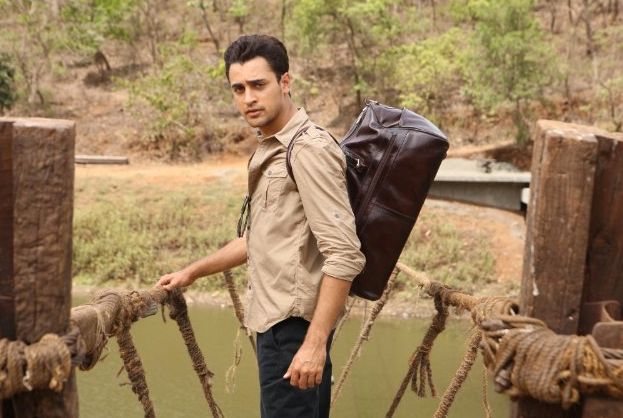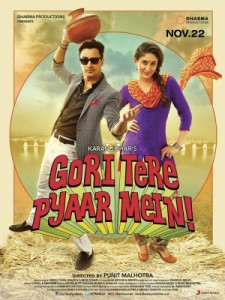
It’s been three years since actor Imran Khan first teamed up with director Punit Malhotra on the hit film I Hate Luv Storys. Khan and Malhotra recently collaborated again for their latest film Gori Tere Pyaar Mein, which opens in theaters today.
Khan plays Sriram Venkat, a disconnected young man who realizes that he has to change his life if he wants to win the affections of Dia Sharma (Kareena Kapoor Khan). We spoke to Imran Khan recently during the New York stop of his press tour. A slightly edited transcript of our conversation is below.
Congrats on the film. I know you were born here in the United States. How does it feel when you come back? Do you feel American at all?
I wasn’t just born here, I went to high school in Sunnyvale, California, and then I moved back to India and then I came back here and moved to LA and went to school here as well. I’ve kind of been back and forth for the longest time.
I never felt American. My friends, my family are back in India, so I’ve always self-identified as Indian. I feel like…somewhere emotionally or culturally that I belong there.
Do you feel at least a tiny bit at home here?
I feel like I understand the culture better than some people. I feel like I can blend in.
Great. So I was really struck by this film because it’s not only a love story, but it’s also a personal journey. Can you talk about Sriram’s personal journey and displaying that on screen?
There’s a tendency in Hindi films — we like to feel that our heroes are larger than life, basically superhuman. And I’ve never personally as an actor have never been drawn to those characters. They don’t excite me. I like flawed characters. I like characters that you can relate to, that you can look at them and think that you probably know that person.
Which is why I like Sriram. He’s not a very good guy, he’s selfish, he’s self-involved, he’s a party boy. He doesn’t really care about anyone other than himself. And the film is about this growth that he has. In order to win back the girl that he wants — the girl he wants to be with — he realizes that he has to grow up, he has to mature.
I find those characters more compelling.
So these characters are better than an action hero, super hero type?
Even an action hero — you know, Hindi movie heroes, for whatever reason they tend to be absolutely perfect in every way. The greatest guy, the greatest husband, the greatest lover, the greatest everything. They are larger than life. It’s not necessarily that it’s an action hero, it’s just that perfection…[Khan makes a face].
There’s a lot of social justice in this movie and I know that in your family, your uncle Aamir Khan in particular, does a lot of social justice work. Do you connect to those messages at all?
Personally I kind of draw a line, I kind of separate my personal life from my movies. I’ve never understood — I’ve never felt a need to have any kind of social relevance or meaning. It’s all well and good if you want to put that in your movie and you feel there’s a need. But I don’t feel like there’s any requirement or compulsion.
For me, a movie is just about entertaining people. Making them cry, thrilling them, scaring them. Whatever that may be. Any kind of social activism, social justice work, the reason to do that is because you want to. You believe in it and you’re compelled to do that from within. For me, I separate them.
What’s a story about working with Kareena that people would not know?
Kareena is a very… frustrating actor to work with. Because, she’ll sit on set and not pay attention to the director at all. So, the director is just running through the character’s emotional turmoil and explaining how [her character] has just broken up with her boyfriend and she’ll just be like [here Khan mimics typing away on a Blackberry while in a completely different world.] Just scrolling through her Blackberry and just looking up and saying “uh huh, uh huh.” And I’m sitting here looking at her and thinking “She has no idea what she’s doing. She has no idea what is going on.”
But then the director rolls the camera and calls action and it’s like a light comes on. It will blow you away — and this has happened more than once. And it’s so good that I’m in the scene with her and I forget my line.
And just before it’s like [Khan does his Kareena-on-a-Blackberry imitation again]. It’s frustrating. You swear that she’s not paying attention and then — [He snaps his fingers] — she nails it.
And then you have me who sits there with a script and [He flips through an imaginary script], with my nose to the grindstone and working, working, working and she just breezes in and makes us all look bad.
 So you can’t be on your Blackberry and then just jump into a scene? You have to be in character the whole time?
So you can’t be on your Blackberry and then just jump into a scene? You have to be in character the whole time?
I can’t. I have to plan it all out and be in the zone. She just switches on and makes us all look bad.
And I know that your wife also has a small role in the film?
She’s in the background. You’ll never see her. (laughs) Avantika has tended to be very friendly with most of my directors. It’s always kind of — the films always have a very handmade feel. Friends and family hanging out and making a film and having fun together. So there are times that she has turned up in the backgrounds of films.
If you actually look around [Khan gestures around the hotel suite set up for his press interviews] a lot of these guys have been with me a long time. I feel like it’s very important to have a team that has a personal stake in my work. My makeup artist, my hairstylist, they’ve been with me since Jaane Tu… They know me, they like me. So for them it’s not just a job. They do personally want to be around and make sure I look my best. That counts for a lot.
And obviously you’ve worked with director Punit Malhotra before on I Hate Luv Storys. How is this film different? You’ve both grown up in a way since then. Does it feel different?
It does. I do have to admit that I’ve been very impressed with Punit’s growth. You expect a director to grow from film to film, step by step. But Punit seems to have jumped a couple of steps since then. His craft and his control on the film was a lot more than what I would have expected from someone’s second film. It’s what you’d expect from a third film or a fourth film. Being a friend, it makes me very happy that he’s grown so much.
Were you surprised at the success of I Hate Luv Storys? It’s one of those movies people have a connection to.
I had a good feeling about it while we were making it, I’ve got to tell you. I got the sense that we were making a film that would be hard to dislike. It’s simple, sweet, genuine and honest. It’s hard to dislike.
And does Gori Tere Pyaar Mein have some of those elements?
The first half is certainly going to be reminiscent of that. Because it’s a space that Punit and I had visited before, so we kind of used it as a springboard. So the first half is going to have a similar feel, but the second half takes a completely different turn into the rustic and rural.
And what was the ‘rustic and rural’ like? Did you have to prepare at all?
No, because it is a fish out of water story. It’s this urban guy who’s never been out of his comfort zone and now he’s in the middle of a village. He’s never dreamed that life could be like that. And it is one of those situations that’s inherently funny. Ripe for comedy. Really, anything you do in that situation is going to be funny.
When you were in high school here, did you feel like a fish out of water then? Did you play sports or act in plays?
I was in AV Club. No, no plays. At that point, I wanted to be a director, I wanted to be a filmmaker. So I kind of focused my energy towards that. So writing and AV Club. But I did feel a bit like a fish out of water in high school. I never quite fit in.
So when did you decide to focus on acting rather than directing?
Weirdly enough, I went to film school to train as a director and a writer. The acting gig came up because I ran into Abbas Tyrewala, who was making Jaane Tu… and he offered me a role. It was straight out of left field. I wasn’t thinking [about acting]. He did one of those [Khan imitates Tyrewala pointing at him], “You! You should act in my film!” And I said, “Me?”
I stumbled sideways into it. It was a mistake.
But it worked out.
Yeah, it’s weird how it worked out.
I was actually at the press conference for Break Ke Baad 3 years ago, and that was just after you got engaged and were about to get married. Has marriage changed you at all or affected the roles you take?
[Vigorously shakes head.] No. People ask me all the time, “What’s it like working with Kareena? You’ve worked with her before she got married, you worked with her after.” And I don’t know how to answer that.
Do you think marriage changes people?
No more than a haircut does.
Well, everyone makes it sound like a life altering thing?
I think those people are not actually married. It changes your life as much as you want it too. I truly would compare it to a haircut. It only changes your life if you want it to.
But then a haircut grows out and then you can start over and change it.
That’s what I’m saying. That how big a change it is. You sign a document, you get a piece of paper. What matters is your commitment to someone.
So do you find it annoying that so many people ask you about your wedding?
I find it irrelevant. It’s like asking about dinner.
Lakshmi Gandhi is an editor at The Aerogram. Follow her on Twitter @LakshmiGandhi and follow The Aerogram @theaerogram.












